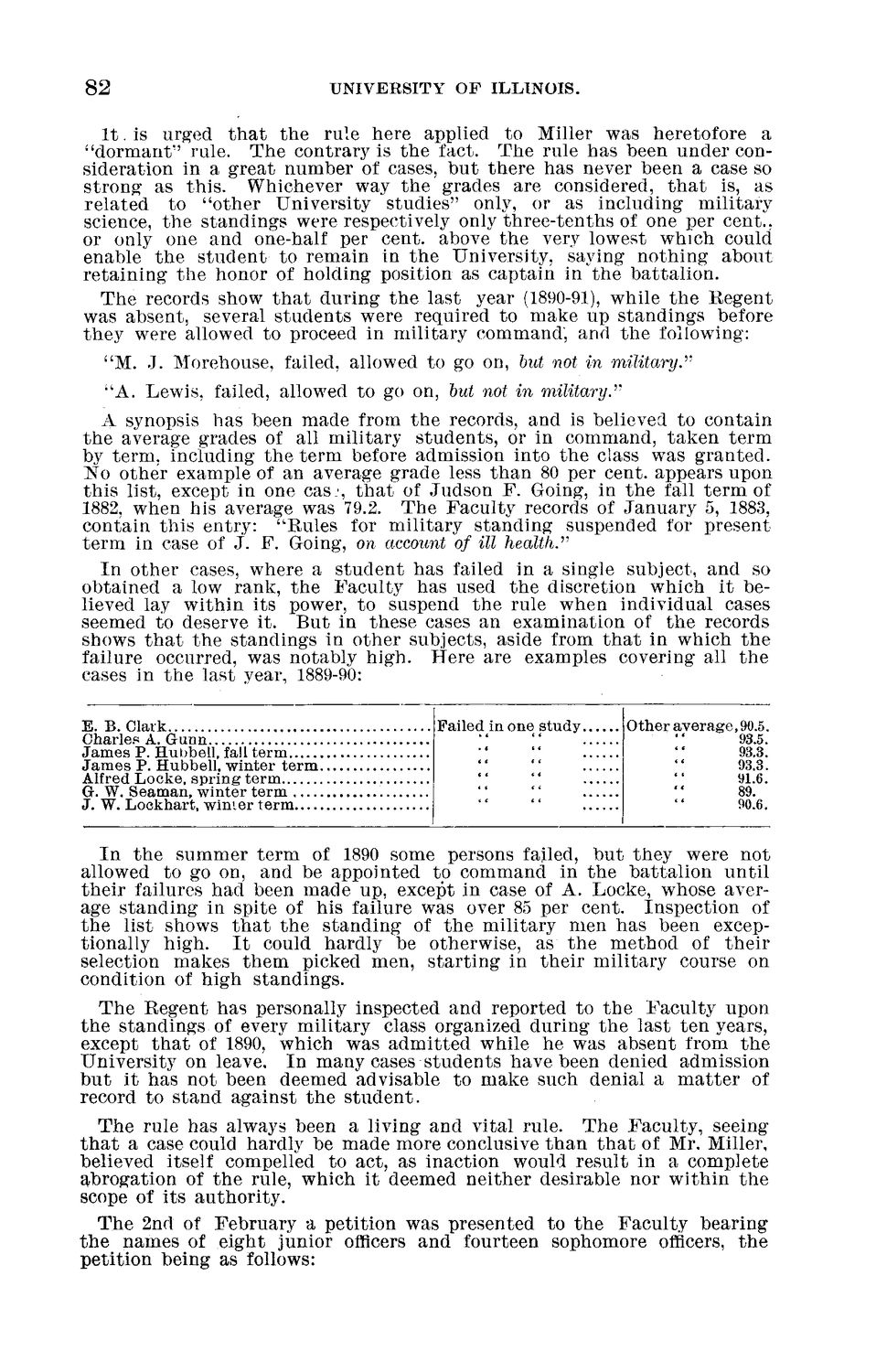| |
| |
Caption: Board of Trustees Minutes - 1892
This is a reduced-resolution page image for fast online browsing.

EXTRACTED TEXT FROM PAGE:
82 UNIVERSITY OF ILLINOIS. I t . is urged t h a t the rule here applied to Miller was heretofore a "dormant" rule. The contrary is the fact. The rule has been under consideration in a great number of cases, but there has never been a case so strong as this. Whichever way the grades are considered, t h a t is, as related to "other University studies" only, or as including military science, the standings were respectively only three-tenths of one per cent., or only one and one-half per cent, above the very lowest which could enable the student to remain in the University, saying nothing about retaining the honor of holding position as captain in the battalion. The records show t h a t during the last year (1890-91), while the Regent was absent, several students were required to make up standings before they were allowed to proceed in military command, and the following: "M. J. Morehouse, failed, allowed to go on, but not in military." "A. Lewis, failed, allowed to go on, but not in military." A synopsis has been made from the records, and is believed to contain the average grades of all military students, or in command, taken term by term, including the term before admission into the class was granted. ^No other example of an average grade less than 80 per cent, appears upon this list, except in one casj, t h a t of Judson F. Going, in the fall term of 1882, when his average was 79.2. The Faculty records of January 5, 1883, contain this entry: "Rules for military standing suspended for present term in case of J. F. Groing, on account of ill health." In other cases, where a student has failed in a single subject, and so obtained a low rank, the Faculty has used the discretion which it believed lay within its power, to suspend the rule when individual cases seemed to deserve it. But in these cases an examination of the records shows t h a t the standings in other subjects, aside from t h a t in which the failure occurred, was notably high. Here are examples covering all the cases in the last year, 1889-90: E. B . Clark Charles A. G u n n J a m e s P . Hubbell, fall t e r m J a m e s P . Hubbell, w i n t e r t e r m Alfred L o c k e , s p r i n g t e r m G. W. Seaman, w i n t e r t e r m J. W. L o c k h a r t , w i n i e r t e r m Other average,90.5. 93.5. 93.3. 93.3. 91.6. 89. 90.6. In the summer term of 1890 some persons failed, but they were not allowed to go on, and be appointed to command in the battalion until their failures had been made up, except in case of A. Locke, whose average standing in spite of his failure was over 85 per cent. Inspection of the list shows t h a t the standing of the military men has been exceptionally high. I t could hardly be otherwise, as the method of their selection makes them picked men, starting in their military course on condition of high standings. The Regent has personally inspected and reported to the Faculty upon the standings of every military class organized during the last ten years, except t h a t of 1890, Which was admitted while he was absent from the University on leave. In many cases students have been denied admission but it has not been deemed advisable to make such denial a matter of record to stand against the student. The rule has always been a living and vital rule. The Faculty, seeing t h a t a case could hardly be made more conclusive than t h a t of Mr. Miller, believed itself compelled to act, as inaction would result in a complete abrogation of the rule, which it deemed neither desirable nor within the scope of its authority. The 2nd of February a petition was presented to the Faculty bearing the names of eight junior officers and fourteen sophomore officers, the petition being as follows:
| |